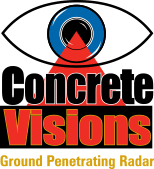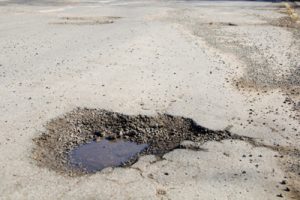Sinkholes are incredibly dangerous. While GPR scanning allows for early detection, it isn’t practical to use GPR scanning on every patch of concrete on every road! Instead, early detection is critical. Pay attention to these signs of sinkholes and the best ways to detect them to protect your property from bigger problems.
The Most Common Signs of Sinkholes
The most common signs of sinkholes in concrete include:
- A large, round circular sunken patch in the earth or concrete
- Any area on your property that is noticeably lower than other areas on the property (suddenly or gradually)
- A natural lake that appeared over the course of only a few years, as sometimes large sinkholes will open up and fill with water
- A foundation that has settled. Some of the most common signs of a foundation settling include a structure that is cracking or drooping.
- Cracking on the road, concrete, or pavement
- A drop in the well levels at any point of the property suddenly or over the course of a brief period (a week or a month)
- An opening in the pavement or ground where rainwater is draining that is not a dedicated drain
Testing for Sinkholes
Testing for sinkholes is a fairly straightforward process and important so that the sinkhole does not collapse and become an even bigger issue.
- Use GPR scanning to detect the size, depth, and characteristics of the sinkhole.
- Work with skilled concrete professionals like those at Concrete Visions to develop a plan for stabilizing the sinkhole. We can perform a variety of procedures including injecting the hole with concrete to help stabilize it or injecting metal pilings to help remove some of the pressure from the concrete surface.
Sinkhole Testing with Concrete Visions
Concrete Visions has over 12 years of experience and expertise in concrete scanning and we know how to detect any problems lurking beneath the surface. We use ground penetrating radar accurately and expertly and are familiar in many other methods that can be used when appropriate like concrete x-ray and electromagnetic conductivity. We are also very familiar with the latest construction safety techniques and train all of our workers to do their work quickly, accurately, and safely. If you would like to learn more about how we can help you, give is a call at (410) 766-2210 or visit us online. For more articles and tips, follow us on Facebook, Twitter, LinkedIn, and Google+.

